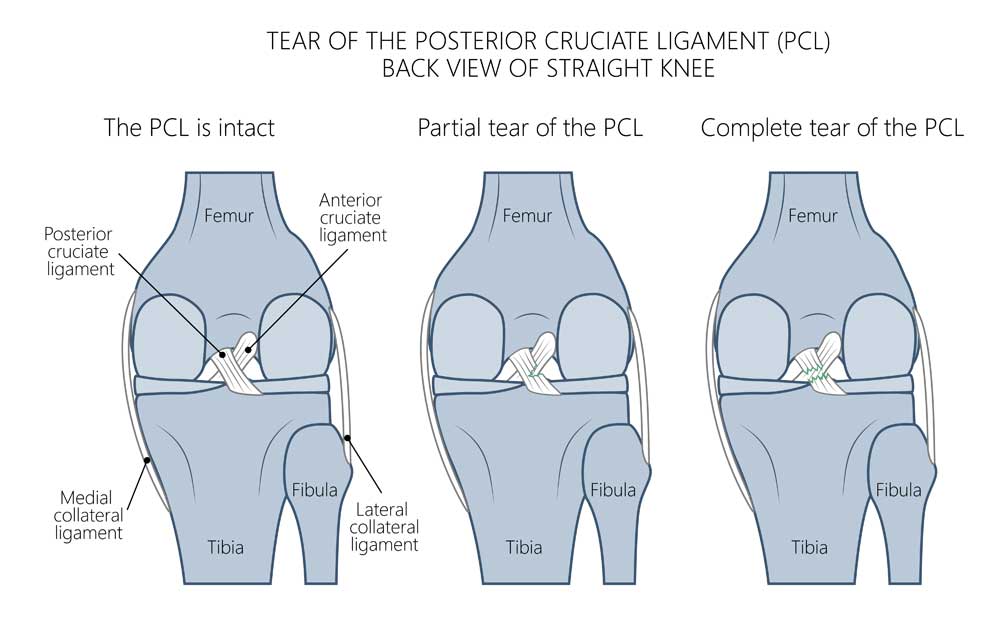PCL Knee Injury Specialist

Are you an athlete who participates in contact sports? If so, you may be at risk of sustaining a posterior cruciate ligament injury knee injury, also called a PCL injury. This type of ligament injury most commonly occurs after a high energy impact to the knee, such as a direct hit or a hard fall onto the knee. PCL tear specialist, Doctor Benedict Nwachukwu provides diagnosis as well as surgical and nonsurgical treatment options for patients in Manhattan, New York City, NY who have sustained a PCL injury. Contact Dr. Nwachukwu’s team today!
What is the PCL in the knee?
The PCL, also known as the Posterior Cruciate Ligament, is located on the back of the knee. The PCL is one of several ligaments that connect the femur (thigh bone) to the tibia (shin bone). The PCL is the strongest ligament in the knee and is thereby injured less often than other ligaments. It has two parts that blend into one structure, about the size of a person’s little finger. This ligament is responsible for keeping the tibia from moving backward too far. If the PCL is injured, it is usually due to a trauma, accident or severe fall. Individuals who ski or play football, basketball or soccer are more likely to suffer a PCL injury. Dr. Benedict Nwachukwu, orthopedic knee specialist, serving patients in Manhattan, New York City and the surrounding New York boroughs has extensive experience in treating patients with a PCL injury.

How is the PCL injured?
A PCL injury is usually caused by a powerful force to the front of the knee and shin. This typically occurs during a fall on a bent knee, hitting the dashboard during an auto accident or from a football tackle.
How are posterior cruciate ligament injuries classified?
Similar to other ligament injuries, a PCL injury is classified depending on the severity of the sprain, strain or tear:
- Grade 1: Sprain or strain where the ligament is pulled or stretched, but the joint remains stable.
- Grade 2: Sprain in the ligament, also referred to as a partial tear, the PCL stretches and becomes loose.
- Grade 3: Tear of the ligament, often called a complete tear or rupture, the ligament has torn into two pieces and the knee joint is unstable.
What are the symptoms of a PCL injury?
A PCL injury rarely happens in isolation and is usually the result of a severe trauma, involving other ligaments in the knee. Patients in New York often seek help for another type of knee injury and discover the PCL is also injured. Some common symptoms of a posterior cruciate ligament injury are:
- Pain, often felt along the outside of the knee
- Swelling
- Difficulty walking downstairs or down an incline
- Difficulty slowing down for a run
- Pain when pushing off to increase speed on a run
- Problems when turning, twisting or pivoting
- Foot drop – a very serious symptom. Orthopedic care is needed immediately, as this is a sign of damage to the peroneal nerve.
How is a PCL injury diagnosed?
Dr. Nwachukwu will obtain a thorough patient history, including the events that led up to the injury. X-rays and an MRI scan will determine the extent of the injury as well as help assess and diagnose any other injuries to the knee. There are rare cases where a patient has injured only the PCL and in such situations, the ligament can often heal without surgery if it has remained in a stable position. It is important to see Dr. Benedict Nwachukwu who understands the complexity of a PCL injury and how to treat it properly.
How is knee stability tested with a PCL injury?
As part of Dr. Nwachukwu’s thorough exam, he will perform several tests to check knee stability and to discern if surgery is necessary. A few tests he may perform include:
- Dial Test: Checks for knee stability. The foot is turned outward with excessive rotation indicating a PCL injury.
- Posterior Drawer Test: Checks for knee stability. This specific manipulation of the leg is done with the patient lying down. Dr. Nwachukwu will bend the knee while applying a slight bit of pressure with rotation. The injured knee is compared to the healthy knee to determine if there is a greater degree of shift.
- Varus Thrust Gait: The patient walks forward in a straight line, while Dr. Nwachukwu looks for a knee that bows outward during adduction.
- Quadriceps Active Test: Dr. Nwachukwu will press against the ankle while the patient pushes their lower leg forward, using their quadriceps muscles. A healthy knee does not move noticeably forward through the movement.
How is a PCL Injury Treated?
PCL injuries that do not involve any other ligaments, bone or soft tissues can often heal on their own with a combination of rest, ice, anti-inflammatory medication and the use of crutches and a brace to keep the weight off the knee. Physical therapy will help improve strength and range of motion.
Surgical Treatment:
In most cases a PCL injury occurs in tandem with other knee injuries and can be repaired at the same time. For a torn PCL, Dr. Nwachukwu may use an autograft (tissue from the patient) or an allograft (tissue from a donor or cadaver) to reconstruct the PCL. The graft is secured to the outer surface of the femur and then threaded through the head of the fibula (smaller bone in the lower leg). The graft is then secured with special surgical screws and sutures.
For more resources regarding the posterior cruciate ligament and PCL injuries along with the treatment options available, please contact the office of Benedict Nwachukwu, MD, orthopedic knee specialist serving Manhattan, New York City and the surrounding New York boroughs.







